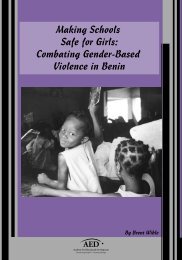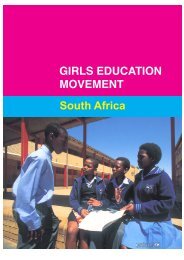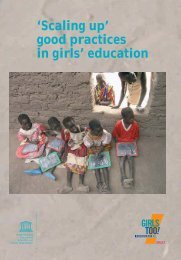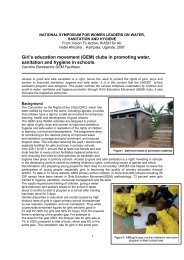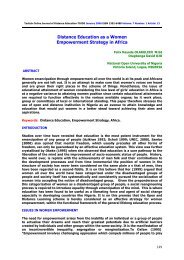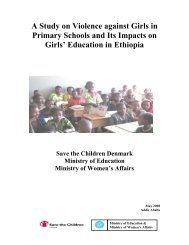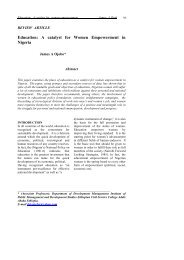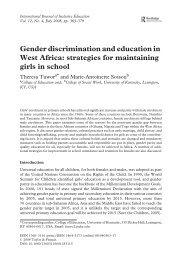Promoting basic education for women and girls ... - library.unesco-ii...
Promoting basic education for women and girls ... - library.unesco-ii...
Promoting basic education for women and girls ... - library.unesco-ii...
You also want an ePaper? Increase the reach of your titles
YUMPU automatically turns print PDFs into web optimized ePapers that Google loves.
urkina Faso<br />
58<br />
major lessons<br />
sConclusions<br />
s<strong>and</strong><br />
T<br />
here is certainly a high level of awareness of the<br />
need to bridge the wide gender gap in <strong>basic</strong> educa-<br />
in Burkina Faso. This awareness is captured in the<br />
ten-year strategic plan <strong>for</strong> the development<br />
<strong>education</strong>. It is also taken as an area of concern by the<br />
NGOs operating in the country.<br />
Fation Fgovernment’s<br />
Fof Fnumerous<br />
NGOs are helping to extend the scope of coverage of<br />
<strong>basic</strong> <strong>education</strong> activities, <strong>and</strong> are complementing the work<br />
government in a number of ways. They seem to have a<br />
strong potential <strong>for</strong> reaching the ’unreached’. They<br />
seem to have acquired experience in linking <strong>basic</strong><br />
to overall human development activities, using<br />
traditional aof<br />
avery aalso a<strong>education</strong> organizational structures <strong>and</strong> collaborating with<br />
local authorities <strong>and</strong> external support agencies.<br />
They have, above all, approached the gender ques-<br />
in a culture-sensitive manner, <strong>and</strong> they seem to be<br />
winning, nboth<br />
ntion<br />
<strong>for</strong> as most of them said in the course of inter-<br />
‘the men are also involved’.<br />
iviews,<br />
iAt the same time, to enhance the sustainability <strong>and</strong><br />
positive impact of the interesting activities currently<br />
on, attention would have to be paid to a number of<br />
challenges:<br />
kthe<br />
kgoing kmajor<br />
Geographical coverage is still a problem. All<br />
actors attest to the fact that some parts of the<br />
country (among them areas in dire need) are<br />
not covered by NGOs, while some other areas<br />
(among them regions that are better off in terms<br />
of access to <strong>basic</strong> <strong>education</strong>) experience an<br />
over-concentration of NGO activities.<br />
There is a general feeling that co-ordination <strong>and</strong>



